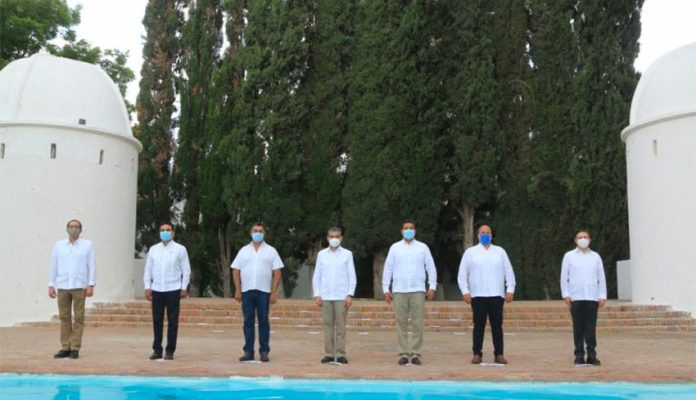The governors of seven states have formed a common front to oppose federal energy policy changes that seek to consolidate control of the electricity market in the hands of the Federal Electricity Commission (CFE) and limit the participation of private, renewable energy projects.
The governors of Nuevo León, Coahuila, Tamaulipas, Durango, Michoacán, Jalisco and Colima announced their pact at a meeting in Parras de la Fuente, Coahuila, on Friday.
The formation of the group comes after the National Energy Control Center (Cenace) announced in late April that surplus fuel oil produced by the state oil company Pemex would be used to ramp up electricity generation at old CFE plants and that trials that allowed wind farms and solar parks to provide electricity for the national grid would be suspended during the coronavirus pandemic to ensure the reliable supply of power.
Cenace’s suspension of the renewable energy trials will delay the commencement of at least 28 renewable energy projects.
The establishment of the common front also comes after the federal Energy Ministry (Sener) published a new energy policy that imposes restrictive measures on the renewable sector that could effectively prevent its expansion in Mexico.
The seven governors said that Cenace’s measures and the Sener policy are harmful to investor confidence and could cause Mexico to violate its commitments under the Paris Agreement, a global pact that seeks to reduce greenhouse gas emissions.
They also said that thousands of jobs could be lost in the renewable energy sector in which both Mexican and foreign companies have invested, and pointed out that clean energy is generated more cheaply that that generated by fossil fuels.
The availability of electricity at lower prices is a competitive advantage that no country has the luxury to give up, the governors said.
The Federal Economic Competition Commission (Cofece) warned earlier this month that electricity rates could go up as a result of the measures that will delay the commencement of new renewable energy projects and ramp up production at old state-run power plants.
The governors warned that the increased use of fuel oil to generate electricity at inefficient CFE plants would also cause pollution and emissions to increase. They called on the federal government to cancel definitively the Cenace agreement and Sener policy, noting that environmental organizations, business groups, ratings agencies and representatives of the European Union have rejected them.
The governors said they reserved the right to take legal action against the measures that threaten the renewable energy sector and the right of Mexicans to a healthy environment.
Sener’s policy has the potential to cause “serious consequences to the health and lives of millions of Mexican families,” said Tamaulipas Governor Francisco García Cabeza de Vaca.
The governors said they are concerned about the economic impact of the coronavirus pandemic and are thus developing policies to limit it. In that context, they said they are obliged to do all they can to maintain the confidence of renewable energy companies that have invested in their states and created jobs.
The measures announced by the federal government will cause millions of dollars in investment to be lost and lead to a lack of opportunities in the renewable sector for recent university graduates, they said.
Source: El Universal (sp)
